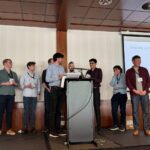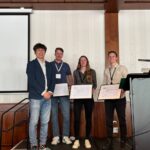An annual conference that offers PhD students a platform for presentation and discussion of their results in an international setting.
Since 1982 the Dutch and Belgian systems and control community has met yearly for a three day conference in which recent research results are presented, international keynote speakers are invited, and tutorial mini-courses are given by senior researchers. In the course of years this yearly Benelux Meeting on Systems and Control has become an important event where academics and PhD students from The Netherlands and Belgium meet each other both scientifically and socially. Additionally, the Benelux Meetings serve as a training platform for PhD students to present and discuss their work in an -informal- international setting.
During the Benelux Meeting the “Best Junior Presentation Award” is awarded for the best presentation by a PhD student. Since 2009 the “PhD Thesis Award” for the best Thesis has been awarded as well.
Save the date!
The 45th Benelux Meeting on Systems and Control will take place on March 24–26, 2026 at the Center Parcs De Vossemeren, Lommel in Belgium.
Further details can be found on Benelux Meeting on Systems and Control 2026
The 44th Benelux Meeting on systems and control took place from March 18-20, 2025 at Hotel Zuiderduin, Egmond aan Zee, The Netherlands. Visit the dedicated website for more information:
Benelux Meeting on Systems and Control 2025
The Best Junior Presentation Award (BJPA) is an award that since 1996 has been granted by DISC and awarded to the Dutch or Belgian PhD student that gives the best presentation during a Benelux Meeting.
Recent winners of BJPA are:

2025 – Amir Shahhosseini (KU Leuven)
2024 – Max van Meer (Eindhoven University of Technology)
2023 – Luuk Poort (Eindhoven University of Technology)
2022 – Flavia Sofia Acerbo (KU Leuven)
2020 – Clara Menzen (Delft University of Technology)
2019 – Henk van Waarde (University of Groningen)
Amir Shahhosseini (KU Leuven) – Best Junior Presentation Award 2025 winner:
I am honored to receive this award, and I would like to express my gratitude for this recognition. Beyond the personal honor, I am especially heartened by what this award represents more broadly—the growing attention being paid to neuromorphic systems within the control community. I am hopeful that continued dialogue and collaboration within our field will further enrich the foundations of neuromorphic theory.
Thank you once again. It is a privilege to be part of such a forward-looking community.
The PhD Thesis Award was established in 2009. It is a yearly award for the best defended thesis of a DISC PhD student. As from 2025 the first prize winner gets this award and a prize of €1000,-, the second prize winner an award and a prize of €500,- and the third prize winner an award and a prize of €250,-
Recent winners:

2024
– Leontine Aarnoudse (TU/e), first prize
– Max Bolderman (TU/e), second prize
– Lizan Kivits (TU/e), third prize
2023 – Mehran Shakarami (RUG)
2022 – Feye Hoekstra (TU/e)
2021 – Jaap Eising (RUG)
2020 – Henk van Waarde (RUG)
2019 – Stefan Heijmans (TU/e)
Leontine Aarnoudse (TU/e) prize winner DISC Best Thesis Award 2024 (1st prize):
I am honored to receive the DISC Best Thesis Award and would like to take this opportunity to thank once again my supervisors, colleagues and collaborators who contributed to the PhD process. I would also like to thank DISC, not only for the award but more importantly for the highly valuable courses and Benelux meetings I was able to attend during my PhD. During the award ceremony it was mentioned that my thesis addressed the development of new learning-based control strategies as well as the implementation of those strategies on real systems. For me, research is most interesting at this crossroads of theory and application, and I hope that that is indeed reflected in my thesis on “Data-driven randomized and nonlinear learning for control,” which I can recommend to anyone interested in the possibilities of learning-based control for complex systems.
Max Bolderman (TU/e) prize winner DISC Best Thesis Award 2024 (2nd prize):
I am honored to have won second price for the DISC PhD thesis award 2024 for my thesis entitled: “Physics-guided neural networks for high-precision mechatronics”. Within this work, we investigated the use of artificial intelligence, and in particular neural networks, in combination with prior physics-based knowledge to accurately model system dynamics from data. Using the resulting models for feedforward control and commutation resulted in improved performance for high-precision mechatronic systems. Special thanks to my supervisors Mircea Lazar and Hans Butler. In addition, it was with great pleasure to again join the DISC Benelux meeting on Systems and Control and meet former colleagues and friends, now from the perspective of my new role as system engineer at IBS Precision Engineering.
Lizan Kivits (TU/e) prize winner DISC Best Thesis Award 2024 (3rd prize):
My PhD thesis is entitled modelling and identification of physical linear networks. In this thesis, physical networks are described in terms of individual elements that are interconnected with each other. By exploiting the symmetry property of the linear physical elements, the requirements for identification of the dynamics of (a part of) the network become rather simple, leading to simple and cheap experiments. Further, it is often challenging to find the cause of an error in such a complex system. The developed network description in terms of interacting symmetric elements makes it easy to locate faulty elements, leading to faster repairs.
Winning this award is a tremendous recognition of the quality of my work. It boosts my confidence in my research capabilities and motivates me to proceed with research.